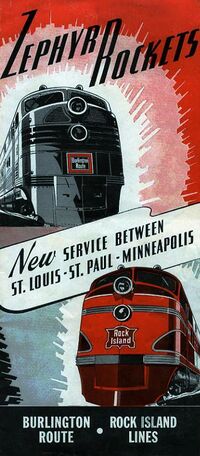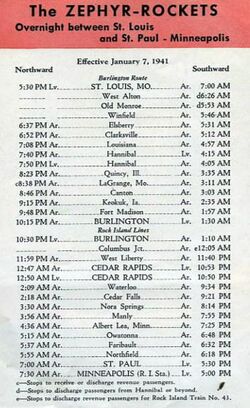Engineering:Zephyr Rocket
The Zephyr Rocket was an overnight passenger train operated jointly by the Chicago, Burlington and Quincy Railroad ("Burlington Route") and the Chicago, Rock Island and Pacific Railroad ("Rock Island Lines") between Saint Louis, Missouri and the Twin Cities of Saint Paul and Minneapolis, Minnesota, with major intermediate stops in Burlington, Cedar Rapids, and Waterloo, Iowa. The Chicago, Burlington & Quincy carried the train between St. Louis and Burlington, while the Chicago, Rock Island and Pacific carried it between Burlington and Minneapolis/St. Paul. Motive power and equipment were pooled and traveled the entire distance without change.
The trains, with coaches and sleeping cars, started operating on January 7, 1941.[1] They also carried round-end observation cars with the train's name emblazoned on the rear for several years.
The train was named by combining the nicknames of the operating railroads' passenger train fleets: The passenger trains of the Burlington Route were called Zephyrs, while those of the Rock Island Lines were called Rockets, hence Zephyr Rocket.
In 1964 the train was still earning money above its direct costs, at least for the Chicago, Burlington & Quincy.[2] In 1967 the train, by then coaches-only, was discontinued, with the last trains departing on April 8 and arriving at their respective end points the following morning.[3]
Unfortunately, it would not be possible to re-institute direct passenger rail service between the Twin Cities and St. Louis today, as a key part of the route, between Burlington and Cedar Rapids, was abandoned when the Rock Island ceased operations in 1980. Portions of this section have been converted to bicycle/hiking trails.
References
- ↑ "Zephyr Rocket Consists". Rock Island Technical Society. https://web.archive.org/web/20150208074112/http://www.rits.org/www/equipment/rizeph.html. Retrieved 8 July 2012.
- ↑ Frailey, Fred W.(1998). Twilight of the Great Trains, p. 108. Waukesha, Wisconsin: Kalmbach Publishing. ISBN:0 89024 178 3.
- ↑ Frailey, p. 113



